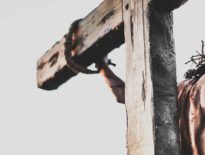Our greatest, most desperate need today is not the type of change which loses its power over time, but that which leads to our transformation into a permanent Good.
The factor determining whether you reach your destination of choice is the direction in which you look during the process of change and transformation. Wherever you look, that’s where you’ll end up. What you look at, that’s what you’ll become. What worries you will transform you.
Strangely, someone’s choice does not always coincide with the desire they express. “Let me die the death of the righteous, while I walk on the path of the unrighteous!” was Balaam’s true wish, although the ancient biblical prophet uttered other words. His intention was to curse God’s chosen and protected people. Sometimes you want something, but you choose something else, in the hope that this will not affect the object of your desire. What a bitter illusion! It’s as if you long for justice, but you’d tolerate a bribe at the same time.
The direction determines the destination and a specific destination requires a specific direction. There are two directions in which you can look when you experience change: either you look back and hesitate or turn around, even though you say you don’t want to (think of the Egyptian meat pots the Jews in exodus longed for), or you look ahead and, by faith, become an inhabitant of the promised land (think of Joshua and Caleb, also during the exodus).
The change that looks back—what we will call reversible change—is, in most cases, just a status change of evil, which, in fact, will return in an aggravated form, while the forward-looking change—what we will call irreversible change—is essentially a new creation.
When the snake sheds its skin or when the wolf changes its fur, we are dealing with a reversible change, not a new creation. Someone who wears a new coat has not experienced a deeper renewal than a broken car which has been repainted; so it is with the natural man even while water from his baptism is still dripping off him. From the first moment of change, the snake’s skin and the wolf’s fur begin regrowing and, after some time, they will be like the ones they replaced and will, in turn, need change. But when we talk about the larva that becomes a butterfly, we are talking about a change towards the destination, an irreversible change. This is a one-way change, which we can certainly call transformation. The butterfly is not an improved larva, but a transformed larva, capable of transforming its environment.
Adaptation, improvement or metamorphosis?
Transformation into good is not an adaptation, a modification or an imitation. It does not mean acting like the ultimate Good; what it means is becoming like Him. Only those who have been transformed can enjoy the new creation, the process of transforming the world. The one who experiences only a reversible change “sees, but does not partake” in the new creation. While this kind of change comes and goes, goes and comes back, the change that transforms is linear, a one-way, destination-oriented road. It does not act on the principle of ebb and flow, but on the model of the flow of a river, which never returns to the source. Each step of irreversible change is unique, stage-specific and unrepeatable.
Unlike the pendulum effect of natural, reversible change, transformation is a metamorphosis: a continuous movement from the initial stage to the final stage. The transformation “burns the bridge” behind it; temporary change means crossing the bridge, but not burning it, because this type of change has in itself the seed of return. The smoker who says he wants to quit smoking, but keeps a pack of cigarettes at hand, just in case, is already planning his mind to return to his original state. Saul experienced the momentary change, under the strong impression of David’s generosity and honesty: “Son of David, you are better than I am!” However, as soon as the wave of emotion passed, he returned to his initial state, only much lower.
The individual experience is repeated at the collective level. Thus, the book of Revelation foretells that, in the sight of the King of kings, all will declare: “Your judgments are righteous and true, O Lord,” and “every knee will bow.” However, the same knee that had bowed will then strain to besiege the holy city. Those who experience only a momentary change do not experience a transformation. If, before falling to their knees and acknowledging the truth that has always and everywhere been evident, they did not dare attack the camp of the saints and the beloved city, now they are throwing themselves upon it with the wrath of hell. They fell far below what they were before the momentary change they experienced. The Bible says of the wicked that when the demon is cast out of a man, “takes with it seven other spirits more wicked than itself, and they go in and live there. And the final condition of that person is worse than the first” (Matthew 12:45). This is the inevitable product of reversible change, according to human, natural, worldly precariousness. Such a course of change ultimately leads to the collapse into an irreversible change, into a transformation into the resemblance of evil. He who does evil and persists in it eventually becomes evil himself.
God does not expect from us and does not work in us an improved version of our past or present life. He works for our renewal and transformation into a well-defined and clearly expressed destiny, springing from pure love for us: born of several brothers. “And he called them whom he had appointed in advance, and those whom he called he counted righteous. and he glorified those whom he considered righteous.”[1]
Rebirth
“He chose us in him before the creation of the world to be holy and blameless in his sight. In love he predestined us for adoption to sonship through Jesus Christ, in accordance with his pleasure and will—to the praise of his glorious grace, which he has freely given us in the One he loves.”[2]
This divine work is called “being born again”, and birth has in itself the “thought of eternity,” because a man, once born, can no longer be unborn, but remains born forever. Transformation is the work of God in and for man, and natural change is the work of man by himself, intended for himself, but completed against himself. For reasons known only to them, people work on the “improved” version of the evil in them and deliberately refuse the transformation offered as a gift by God. This happens either for the better or for the worse; in biblical terms, this action is called “sealing”. The fundamental difference between momentary change and transformation is that one is nothing but the old evil, temporarily improved, while transformation is the future good, permanently and definitively updated. Obviously, the destinations of the two are different and they are mysteriously related to the relationship with the “past”. Momentary change cultivates the past until it brings it back to the present; true metamorphosis “breaks” definitively with the past. During the change of human nature, we act facing the past; in the divine transformation, we “forget what is behind and strain toward what is ahead” (Philippians 3:13).
Burnt bridges
We can now understand why our desire to end the evil in our lives has often failed. We find that the change we are urged to or that we ourselves so fervently claim, is nothing but an “autoimmune disease.” We are always at a crossroads, between the reversible, human change, and the final transformation of a divine nature. The choice we make, in full lucidity and consciousness, decides the course and destiny of our lives.
Choosing either a temporary change or a permanent transformation involves different attitudes towards the starting point. In order to lose 40 kilograms, pastor Viktor Madoxx made an oath similar to David’s in front of the whole pastoral body: “I would rather have my right hand dry than stretch out to the food I don’t need!” Many years have passed since then and his right hand has kept its oath, so it has not dried up. Instead, in the words of Achan, the Jewish warrior who appropriated a God-forbidden spoil of war (“a beautiful robe from Babylonia,(…) and a bar of gold”) shows his living attraction for his cursed acquisition. His testimony of his own deed was the product of a momentary change, a change dictated by circumstance, like an arch pressed by a weight. It was like Esau’s tears of “regret” or Judah’s confession of the sin of his betrayal.
Keeping your eyes on the target
It is not difficult to read in the faces of men a note of exhaustion or, as the prophet Jeremiah called it, a state of being “desolate, faint all the day long.”[3] The call for change is often heard and, not infrequently, the desire becomes a deed. We celebrate the victory of change, but not without that permanent shadow of doubt and not without fear, because we know that the element of time has an important role here. Experience has taught us that change is an intersection beyond which we either go forward, to transformation, or return to where we left off, or often far below. If it does not become a transformation, the change lasts a longer or shorter time, but, like a river deviated from its course, man also tirelessly seeks to return to his original state. Nevertheless, this return is not exactly to the initial state, because the mind, once extended to the level of an idea or state, can never return exactly to the initial state. That state has, in fact, disappeared with the attempt to change. The Bible states unequivocally, “The latter condition of man becomes worse than the first.”[4]
Someone says, “I tried seven times and I fell every time.” It’s okay, get up for the eighth time! Don’t make your falling your prison. Do not despise your suffering, but value it in the divine process of transformation. Each of the seven attempts were instances of reversible, human, natural, or even demonic change. This was obvious from the relapse and the recurrence; by their fruit we will know the origin and nature of change. Now, the eighth time, there will be an irreversible change, that is, you will be transformed, because this does not come from any human, but from the Lord: “If any man be in Christ, he is a new creature: old things are passed away; behold, all things have become new.”[5]
What we are is God’s gift to us. What we choose to become is our gift to God.
“See, I set before you today life and prosperity, death and destruction.” (…) The way to life is the irreversible change or transformation under the power of the Holy Spirit; the way to death is the reversible change or decay in the name and power of man. You choose, man! What a shocking and responsible saying, followed by a Word: “I have chosen you!” God chooses those who choose Him. When we are told, “Choose!” the word does not refer to an object, but to Someone! “Choose who you want to serve today!” Choose life, by changing without change, as a gift from Him in which “there is no change, no shadow of moving.”



















